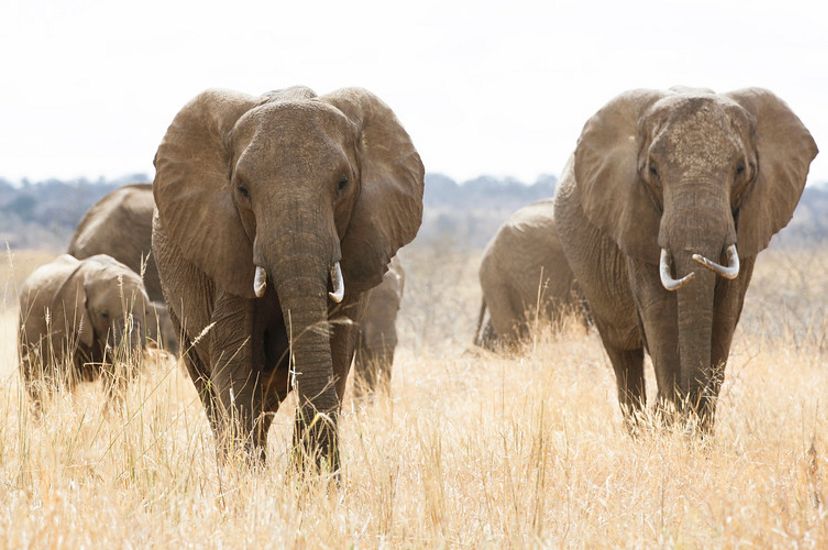Using Fireworks to Save Elephants in Tanzania
Crop protection teams use fireworks, chili powder, and flashlights to safely redirect elephants off farmland.
It’s a little after midnight on a Tuesday in June and a young bull elephant is foraging in near-silence. There is no way for him to know that he’s wandered out of the boundaries of Tarangire National Park and is currently munching on corn in a family farm.
It doesn’t take long before a bright flashing light appears in the distance, followed by the screeching of an air horn. While these unfamiliar lights and loud noises are usually enough to get an elephant to leave, this male seems unfazed. A few minutes later, an object shoots through the air, bursts open with a bang, and a cloud of chili powder overtakes the elephant’s senses. He quickly turns, and disappears into the grassland.
Why are these men throwing chili powder at elephants? In order to save their lives.
As more and more people turn to farming in corridors where elephants range, conflicts between the two cause huge problems. When an elephant wanders onto a villager’s farm, it can have a devastating effect: A single elephant can destroy someone’s food supply for the entire year in one night, trample property, and threaten a family’s safety.
In the past, when an elephant made a wrong turn and ended up in a community garden, a villager used the only defense he had against a five-ton animal: a spear. A direct hit was always enough to chase her away…and make sure she would never come back. More than likely, she retreated into the park before succumbing to her wounds after a few days.
But these villagers now have a better—if slightly unorthodox—way to redirect elephants away from their crops. Honeyguide, with critical support from The Nature Conservancy, has created a unique, four-step elephant alarm system to protect a villager’s food source without harming the elephant.

How It Works
Honeyguide is deploying this alarm system through 60 “crop protection teams” across northern Tanzania. Each team of 10 or more volunteers nominates a leader to receive training on how to use the elephant alarm kit. Each night, the crop protection volunteers keep watch throughout the village. If an elephant is spotted heading into an agricultural area, the team leader springs into action, armed with his elephant alarm kit.
The alarm system involves four sequential steps, each deployed only if the previous strategy didn’t work. These methods do not harm the elephant, they just make the elephant uncomfortable enough to turn around. (Watch this short video to see how it works.)
Step 1: Shine very bright flashing lights at the elephant
Step 2: Sound off a very loud air horn
Step 3: Throw a “chili cloud”—chili powder mixed with sand and a lit firecracker inside of a condom—near where the elephant is grazing
Step 4: Set off a roman candle—they are loud, bright, and a little scary!
“I’d heard that both thunder claps and chili powder were effective in keeping elephants away from farms, and so I decided to try and merge these two components of sound and smell together,” said Damian Bell, executive director of Honeyguide. “At Honeyguide, we are always looking for innovative solutions to prevent and reduce human-wildlife conflict.”
The Nature Conservancy is providing direct financial support to 35 village teams in two community-led wildlife management areas, as well as supporting the governance of the entire network. Honeyguide estimates that the program will create 20 to 30 new crop protection teams within the next year.
Quote: Damian Bell
At Honeyguide, we are always looking for innovative solutions to prevent and reduce human-wildlife conflict.
Worth More Alive
The elephant alarm system does more than protect one wandering elephant and one family’s crops each night: It’s part of a holistic strategy to protect landscapes, natural resources, and wildlife for the long term.
Ensuring that local communities benefit from wildlife, and are engaged in their conservation, is a key element of our work to save them.
“In Northern Tanzania, elephants are worth more alive than dead because they attract tourism, which creates jobs for a lot of people,” said Matt Brown, TNC Africa’s Conservation Director. “But for communities that are located closest to conserved areas, the safety of your family and your crops has to come first. Farmers can’t support conservation of wildlife migration corridors if the animals threaten lives and livelihoods.”
The elephant alarm system is already changing lives in communities across northern Tanzania. As one crop protection volunteer recently put it: “This system is so helpful and easy… and now we don’t have to use spears.”
“We want farmers and communities to continue to be conservationists, and in order to achieve this I believe that the elephant needs to be seen as a friend rather than foe,” Bell said. “Since we have developed the toolkit, the community members are much more confident that they can keep elephants out of their fields and live alongside elephants peacefully.”
Human-wildlife conflict has become a growing challenge for conservationists, and Honeyguide’s elephant alarm system is an ingenious and inexpensive way to reduce these conflicts that TNC is proud to support.
You Can Help Save the Lives of Elephants
We need your help taking this simple solution to more villages, potentially saving hundreds of elephants and the livelihoods of hundreds of elephants.
Each elephant alarm kit costs $530. It includes a high-powered flashlight, an air horn, 60 chili clouds, 3 roman candles, a first aid kit and a team leader jumpsuit.
Your gift will go far:
- A donation of $25 could fund 9 chili clouds.
- A donation of $50 could fund one air horn and 2 chili clouds.
- A donation of $100 could fund one roman candle and 22 chili clouds.
- A donation of $10,000 could fund expanding the program into 20 more villages.






